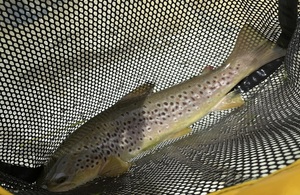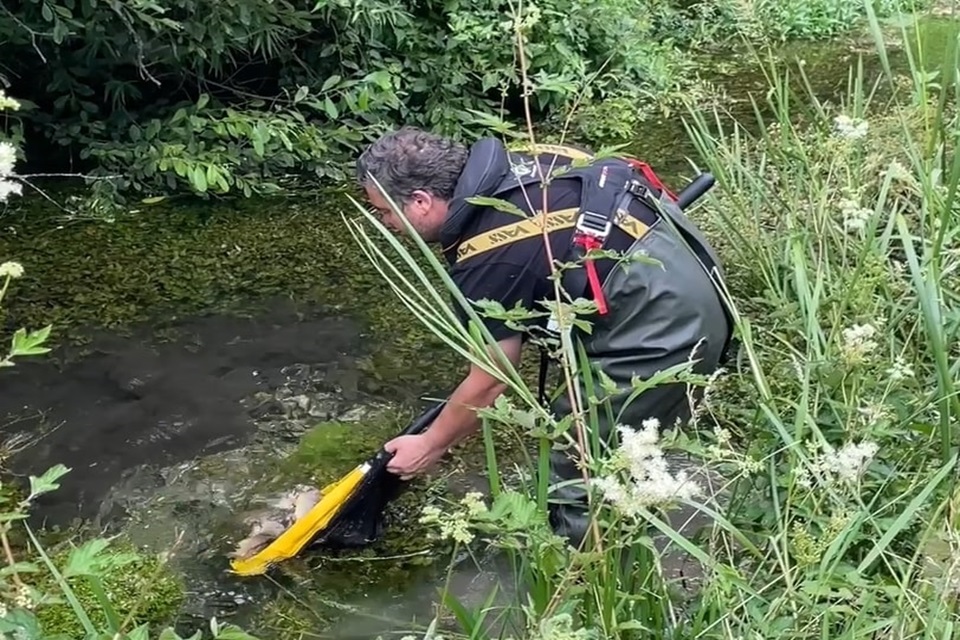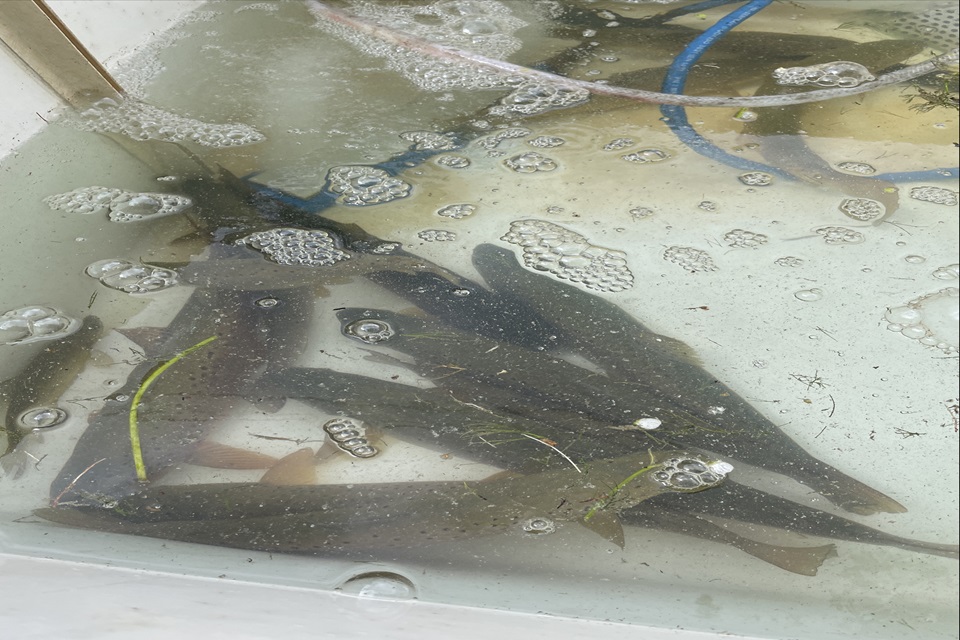LAM-BOURN AGAIN! - Second chance for dozens of Berkshire fish
Some 50 brown trout in the Thames Valley have been given new homes as the dry spell has an increasingly challenging effect on wildlife and habitats.

Fisheries officers at the Environment Agency were quick to move dozens of brown trout like this one to deeper waters to help them survive the warmer temperatures
Fisheries officers from the Environment Agency swung into action today, Friday 18 July, to rescue the fish from a shallow area of the River Lambourn at Eastbury, near Hungerford, in Berkshire.ĚýÂ
Expected rainfall is down by 50 per cent in the Thames Valley over the last 3 months. This and 3 heatwaves in just a few weeks have put more pressure on our natural life.ĚýÂ Â Â
Moving day
The otherwise-healthy fish were removed from the Lambourn in oxygenated tanks, then rehomed in deeper waters a short distance downstream. Officers will monitor the juvenile and adult trout to make sure they get used to their new surroundings.ĚýÂ

Peter Gray, from the Environment Agency fisheries team, carefully puts some rehomed brown trout back into the River Lambourn in Berkshire
Driest spring since Victorian times
The rescue and relocation comes after the country suffered its driest spring since the last years of Queen Victoria, and June was the hottest in England – ever!Â
Peter Gray, fisheries team leader in the Thames Valley for the Environment Agency and in charge of the transfer of fish, said:Â
“We hope this population of brown trout, up to around 3 years old, will be much happier in a part of the Lambourn with stronger flows.Ěý Â
“We’ve acted today to save the fish. They can be the first casualties when conditions deteriorate, and react better to being moved in cooler temperatures.”Â
Earlier this month, the Environment Agency declared the Thames Valley and parts of Surrey as being in a period of prolonged dry weather, and is keeping a potential move to drought status under close review.ĚýÂ
To help meet the demands on nature, Environment Agency staff across England are stepping up monitoring of river systems, and being even more prepared than usual to respond to pollution incidents as a result of climate change bringing extreme weather.ĚýÂ
Specialist staff are carrying out more rescues like this one, which are funded by fishing rod licences, and supporting farmers and others who take water from rivers under licence to maintain their business.Ěý

The Environment Agency is available to relocate fish if they become stranded in shallow waters like these did in Berkshire
Do your bit
The public is urged to do their bit to save water, whether turning taps off when brushing your teeth, or complying with any restrictions on water use. Out and about – anglers, swimmers and boaters are all asked to report any environmental concerns they see.ĚýÂ
This could be noticing fish gasping for air on the surface of a river or lake, a sure sign oxygen levels in the water are low. The Environment Agency’s incident hotline operates around the clock: 0800 807060.ĚýÂ
But there’s an onus on the water industry, too. The Environment Agency will ensure Thames Water and the other water companies follow their drought management plans. They must also strengthen efforts to fix leaks, and adjust operations to conserve water.Ěý
North West England, Yorkshire and the West and East Midlands are officially in drought status, based on a series of environmental checks.
Meanwhile, North East England, Lincolnshire, parts of East Anglia, central southern England and a section of the West Country are classed as being in prolonged dry weather, following the latest meeting of the National Drought Group.Ěý
The group comprises the Met Office, government, regulators, water companies, farmers, the Canal and River Trust, angling groups and conservation experts. They will continue to coordinate the national response and safeguard water supplies for people, agriculture, and the environment. Â
Tips on how to save water can be found at .Ěý
Video of the fish being rehomed is available from the Environment Agency press office.
Contact us:
Journalists only - 0800 141 2743 or communications_se@environment-agency.gov.uk.